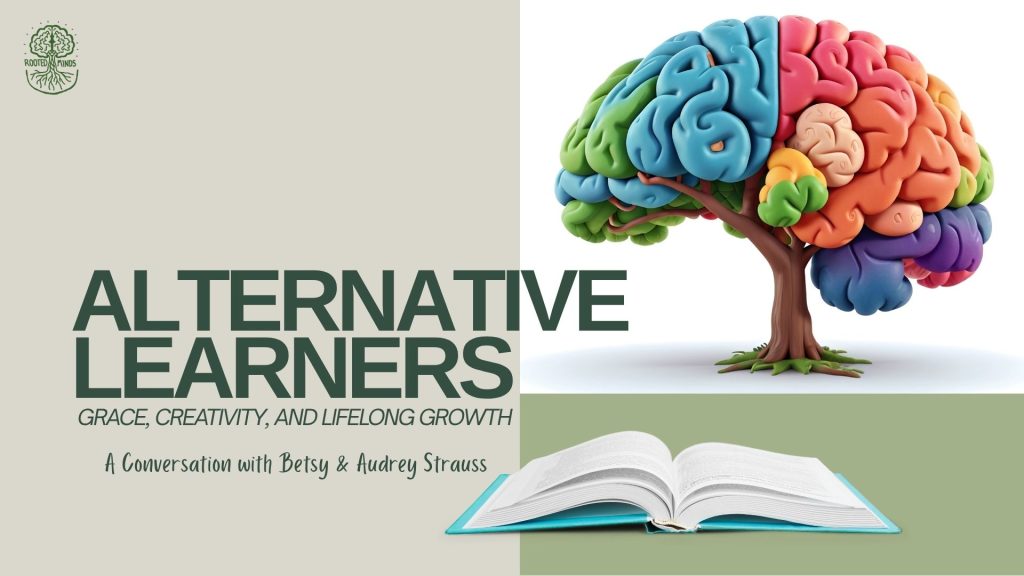Grace for Alternative Learners: Creativity, Brain Science, and Hope
Grace for Alternative Learners: Creativity, Brain Science, and Hope
When my daughter Audrey struggled to read, the world of learning seemed to close in around us. Every subject assumed literacy—math, history, science—all asked her to read before she could even begin. For a long time, I felt like I was pushing her uphill, always behind, always trying to catch up.
But what if the uphill climb is really a different kind of path? What if our learners weren’t meant to fit into the mold, but to show us new ways of growing?
The Brain Science of Overwhelm
When a child struggles with foundational skills, the brain diverts extra energy just to survive the classroom experience. Overwhelm shows up as distraction, resistance, or even shut-down. Underneath is a nervous system working overtime.
Audrey remembers how helpful it was to pause when the overwhelm hit. Instead of pushing through a long, drawn-out fight, a couple of minutes of jumping jacks, breathing exercises, or quieting the body could reset her brain. Those small resets made it possible to get back to work with more focus and less frustration.
(For more on rewiring the brain, see How to Strengthen the Brain or our Neurodevelopmental Plan).
Creativity + Movement = Learning
We discovered that moving the body—taking walks, bouncing a ball, pacing the living room—wasn’t a distraction. It was therapy. It created space for her brain to process.
Audrey adds that even memorization looks different when you’re wired differently. If you give yourself permission for it not to look like everyone else’s process, you’ll often end up retaining more. A willingness to experiment makes the learning journey lighter and more life-giving.
Reading with your ears was another tool that freed her up to engage deeply with content long before her eyes could keep up.
The Challenge of Tests
For students with learning challenges, taking a test can be uniquely draining. It’s not just the knowledge being measured—it’s the added layers of navigating instructions, managing timing, and calming the brain’s heightened stress response. Recognizing that this difficulty is rooted in how the brain processes, not in a lack of intelligence, is a huge gift of grace.
Identity in the Midst of Struggle
Perhaps the most powerful lesson Audrey and I both learned is that identity matters in the learning journey.
When school feels overwhelming, the voices can come fast and sharp:
- You’re stupid.
- You take too long.
- You’re not good at this.
Left unchecked, those messages shape how a child sees themselves. But when we pause to remind ourselves:
- I am a child of God.
- I am a beautiful creation.
- He does not make mistakes—and He didn’t make one with me.
The lies lose their grip. Speaking those truths out loud helps both the student and the parent begin to believe them.
From Struggle to Strength
Fast forward to today: the same girl who once felt locked out of learning is cultivating deep dives into literature, building her own Hebrew course, writing music, and dreaming of becoming a nurse. The detours didn’t hold her back—they shaped her into a tenacious, creative, and deeply empathetic lifelong learner.
Celebrating Non-Traditional Learners
When we steward the unique gifts of non-traditional learners instead of measuring them against a narrow standard, we cultivate wonder, resilience, and depth. Non-traditional learners often:
- See connections others miss
- Carry empathy forged in struggle
- Think outside the box naturally
- Bring perseverance into every field
Our job as parents and teachers is not to make them fit, but to help them flourish.
Take heart, fellow parent.
Grace makes room for creativity. Patience rewires possibility. Time brings forth fruit.
Your child is not behind. They’re becoming.
Featured Webinar: Alternative Learners—Grace, Creativity, and Lifelong Growth
A conversation with Betsy & Audrey Strauss
So many families know the challenge: when learning doesn’t look “typical,” every subject can feel like an uphill climb. Reading struggles, test anxiety, or daily overwhelm can leave both parent and student discouraged.
In this exclusive Rooted Minds webinar, I sit down with my daughter Audrey—once a struggling reader, now a deep diver into literature, builder of her own Hebrew course, songwriter, and future nurse. Together we share:
- The brain science of overwhelm—and how to reset with simple strategies like movement and breathing.
- Why memorization and testing look different for alternative learners (and why that’s okay).
- How creativity, patience, and grace can actually rewire the brain for growth.
- The role of identity in learning—silencing negative voices and rooting in God’s truth.
- The gifts of non-traditional learners and how stewarding them cultivates lifelong learners.
This is not a story of quick fixes—it’s a story of hope, patience, and discovering beauty in the different path.
✨ Available now in the Rooted Minds Member Library!
Betsy Strauss is an unexpected homeschooler, mother of three, who is in a relationship with a sweet man for life. She loves reading books, drinking coffee, and learning anything with her kids.





